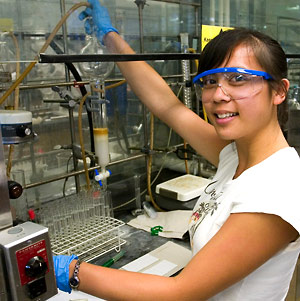College of Chemistry steers course to sustainable 'green' chemistry
| 08 October 2009
BERKELEY — The College of Chemistry at the University of California, Berkeley, is making major new commitments to advance research and education in sustainable, green chemistry.
 Undergraduate
chemistry students will soon be working in "green" labs
that are more energy efficient and minimize the use of harmful
solvents and chemicals. Combined with a new curriculum revision,
these changes will ensure that students get a safe, sustainable,
efficient and inspiring laboratory education. (Michael
Barnes/College of Chemistry)
Undergraduate
chemistry students will soon be working in "green" labs
that are more energy efficient and minimize the use of harmful
solvents and chemicals. Combined with a new curriculum revision,
these changes will ensure that students get a safe, sustainable,
efficient and inspiring laboratory education. (Michael
Barnes/College of Chemistry)The college has appointed Alexis T. Bell, professor of chemical engineering, to the newly established Dow Chair in Sustainable Chemistry. Bell is internationally recognized for his pioneering work in devising new catalysts to protect the environment.
The college also has helped to establish the new Berkeley Center for Green Chemistry - a collaboration among the College of Chemistry, Haas School of Business, School of Law, College of Natural Resources, and School of Public Health. Under the umbrella of the Berkeley Institute for the Environment, the center brings together, for the first time, a multidisciplinary approach to research, education and engagement in sustainable chemistry practice. Combining the expertise of chemical and environmental health scientists with economists and policy experts is at the heart of the center's mission.
The college is embarking as well on an extensive program in 21st Century Chemical Sciences Instruction to redesign both its curriculum and laboratories for undergraduate courses in chemistry to emphasize sustainability.
The Dow Chair in Sustainable Chemistry will provide flexible funding for Bell's research and for supporting graduate students. A member of both the National Academy of Engineering and the American Academy of Arts and Sciences, Bell was recently recognized as one of the "100 Engineers of the Modern Era" by the American Institute of Chemical Engineers.
"I am delighted to learn of my appointment to the Dow Chair," said Bell. "This support will enable me to initiate new projects on advanced catalysts that would otherwise not be possible. I am also looking forward to interacting with researchers at Dow (Chemical Co.) on topics of mutual interest."
Among Bell's projects are the reduction of nitric oxide under oxidizing conditions, the conversion of biomass to fuels, and the electrochemical reduction of water and carbon dioxide to hydrogen and carbon dioxide. He is the author of more than 500 publications.
"Dow is deeply committed to sustainability, and we are very excited to be partnering with Berkeley's distinguished College of Chemistry in advancing both research and education in this field," said David E. Kepler, Dow Chemical's executive vice president and chief sustainability officer. "Our collective future depends on educating the next generation of students to think deeply and broadly about sustainability and to devise new products and solutions that will address the world's interconnected social, economic and environmental challenges."
Plans for the Center for Green Chemistry include research collaborations among investigators from different disciplines and education across disciplinary boundaries. The center is working toward a new minor in sustainability for undergraduates and a designated emphasis in sustainability for graduate students. Both would require students to take coursework in subjects related to green chemistry that are outside their primary disciplines.
 Alex
Bell, who works on the design of catalysts for energy conversion,
is searching for earth-abundant materials that can be used as electrocatalysts
for splitting water to hydrogen and oxygen using energy derived
from the sun.
Alex
Bell, who works on the design of catalysts for energy conversion,
is searching for earth-abundant materials that can be used as electrocatalysts
for splitting water to hydrogen and oxygen using energy derived
from the sun. "The Berkeley Center for Green Chemistry is the first program in the nation to focus the expertise of so many disciplines on green chemistry solutions to chemical pollution and exposure," said Michael Wilson, environmental health scientist at UC Berkeley's School of Public Health and one of the leaders of the green chemistry effort on campus. "We're already starting to learn from each other. This is exactly what I think we need to be doing, and it's at the heart of what UC Berkeley does best."
Expressing his appreciation to Dow for supporting UC Berkeley's efforts in sustainability, College of Chemistry Dean Richard A. Mathies commented, "Ours is a chemical world. The college has a special role to play - in both research and education - to implement the principles of green and sustainable chemistry, which are aimed at improving the environmental and health safety of chemicals and the sustainability of chemical products and processes."
The College of Chemistry has an existing seminar program launched through a grant from the Dow Chemical Company Foundation as part of the Sustainable Products and Solutions Program, a collaboration between the College of Chemistry and the Haas School of Business.
The college's program in 21st Century Chemical Sciences Instruction will rebuild its undergraduate labs to conserve energy and reduce chemical waste. The experiments will also teach students to think about the concepts and practice of sustainable chemistry as a positive solution to issues of global warming, natural resource depletion and the environment.
More than half of all UC Berkeley undergraduates take a laboratory class in chemistry, and, said Mathies, the college has "an obligation and an opportunity to provide the knowledge and information and education necessary so that graduates who work for chemical companies or the government or advocacy groups will have a basic understanding of chemistry, chemical principles, sustainability and toxicology. Academia, industry and the government all have a responsibility for building an environmentally sustainable future."

